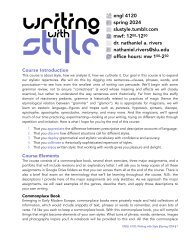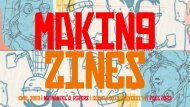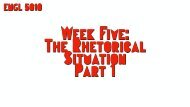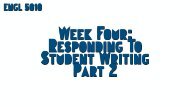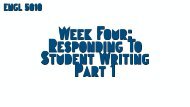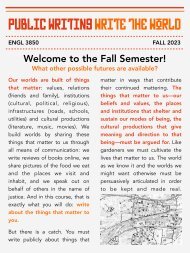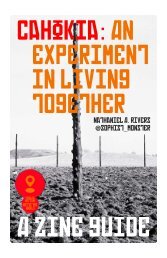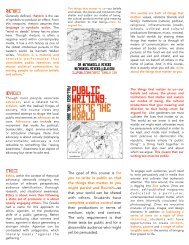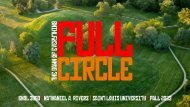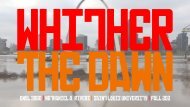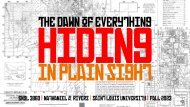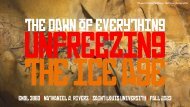ENGL 3860: Dawn of Everything Reading Guide Zine
You also want an ePaper? Increase the reach of your titles
YUMPU automatically turns print PDFs into web optimized ePapers that Google loves.
What I appreciate about the book<br />
is the way it builds its argument<br />
not by moving in a straight line<br />
from beginning to end but rather<br />
accumulates different case<br />
studies from around the world<br />
and across time. The book thus<br />
a v o i d s r e p e a t i n g t h e v e r y<br />
approach to history that it is critical<br />
<strong>of</strong>: that humanity has developed in<br />
lock step from a definite point in<br />
the past to a single point in the<br />
future. If, as the authors argue,<br />
h u m a n i t y i s a n o n g o i n g<br />
experiment in being together,<br />
then the form <strong>of</strong> the book must<br />
echo this experimentation.<br />
We can understand anthropology and<br />
archeology as a history <strong>of</strong> rhetoric in<br />
their stared interest in how people have<br />
arranged themselves and related to one<br />
another. In short, how we make publics.<br />
Dr. Nathaniel A. Rivers<br />
nathaniel.rivers@slu.edu<br />
slupublicrhetoric.tumblr.com<br />
“[I]s not the capacity to experiment<br />
with different forms <strong>of</strong> social<br />
organization itself a quintessential<br />
part <strong>of</strong> what makes us human? That<br />
is, beings with the capacity for selfcreation,<br />
even freedom? The ultimate<br />
question <strong>of</strong> human history, as we’ll<br />
see, is not our equal access to<br />
material resources (land, calories,<br />
means <strong>of</strong> production), much though<br />
these things are obviously important,<br />
but our equal capacity to contribute<br />
to decisions about how to live<br />
together. Of course, to exercise that<br />
capacity implies that there should be<br />
something meaningful to decide in<br />
the first place.”<br />
—Graeber and Wengrow<br />
Critiques<br />
”It then makes sense that Graeber<br />
and Wengrow place significantly<br />
more emphasis on the mental<br />
rather than material dimensions<br />
<strong>of</strong> imagination and choice,<br />
revealing that they are devoted<br />
heirs and stewards <strong>of</strong> a longstanding<br />
European intellectual<br />
tradition who are not proposing<br />
anything so radical or rebellious<br />
after all.”<br />
—Carolyn Nakamura, “Untenable<br />
History” in Offshoot<br />
Why<br />
the <strong>Dawn</strong> <strong>of</strong><br />
everything<br />
in<br />
public<br />
writing<br />
Fall 2023 l <strong>ENGL</strong> <strong>3860</strong><br />
Some possible questions<br />
• Why is it that people, especially<br />
s i n c e t h e E n l i g h t e n m e n t ,<br />
have struggled to imagine the<br />
p o s s i b i l i t y o f r e i n v e n t i n g<br />
themselves? What is it about<br />
modernity in particular that has<br />
made people feel simultaneously<br />
imaginatively empowered and<br />
constrained?*<br />
• If all science relies on simplifications,<br />
how can one do history in a way that<br />
expands rather than reduces our<br />
sense <strong>of</strong> possibilities? What is lost or<br />
potentially gained by relying on<br />
intellectual simplifications?*<br />
Critiques<br />
“The question <strong>of</strong> the origins <strong>of</strong><br />
inequality in human evolution and<br />
history matters a great deal for<br />
how we try to change the world.<br />
But Graeber and Wengrow want<br />
change without attending to<br />
equality and class, and they are<br />
hostile to environmental and<br />
ecological explanations. These<br />
f l a w s h a v e c o n s e r v a t i v e<br />
implications.”<br />
—Nancy Lindisfarne and<br />
Jonathan Neale, “All Things<br />
Being Equal” in Climate &<br />
Capitalism<br />
For generations, our remote ancestors have been<br />
cast as primitive and childlike―either free and equal<br />
innocents, or thuggish and warlike. Civilization, we<br />
are told, could be achieved only by sacrificing those<br />
original freedoms or, alternatively, by taming our<br />
baser instincts.<br />
Drawing on pathbreaking research in archaeology<br />
and anthropology, the authors show how history<br />
becomes a far more interesting place once we learn<br />
to throw <strong>of</strong>f our conceptual shackles and perceive<br />
what’s really there.<br />
The <strong>Dawn</strong> <strong>of</strong> <strong>Everything</strong> fundamentally transforms<br />
our understanding <strong>of</strong> the human past and <strong>of</strong>fers a<br />
path toward imagining new forms <strong>of</strong> freedom, new<br />
ways <strong>of</strong> organizing society. This is a monumental<br />
book <strong>of</strong> formidable intellectual range, animated by<br />
curiosity, moral vision, and a faith in the power <strong>of</strong><br />
direct action.<br />
Some possible questions<br />
• To what extent are humans, even<br />
those who haven’t read Hobbes or<br />
R o u s s e a u , v i c t i m s o f t h e i r<br />
intellectual tyranny?*<br />
• What is or isn’t the role <strong>of</strong><br />
environment and ecology in the<br />
book’s arguments?<br />
• How does technology feature into<br />
Graeber and Wengrow’s tracing <strong>of</strong><br />
the various ways in which humans<br />
have experimented with living<br />
together?<br />
* Questions from David Graeber




